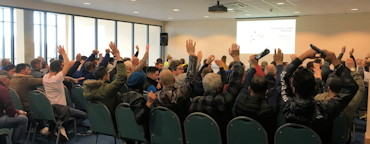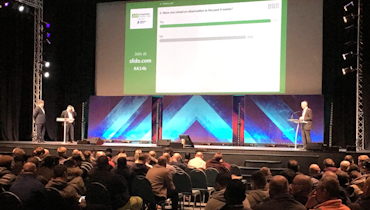Ben writes:
On 7 March I attended the A14 Integrated Delivery Team health, safety and wellbeing impact day in Peterborough.
This was the second impact day on the project. The first day was focused on planning safely – taking time to think about the works we were doing and to reinforce the message to stop work if you think it is not safe.
This day was all about finishing safely. Everyone wants to have a ‘perfect day’ to the end of the project.
On arrival at the Kingsgate Conference centre, we had a complementary breakfast, and were issued with a floor map and a group number for the morning’s presentations.
1. 08:00 – Health and wellbeing: sleep – eat – move
 At the start of the presentation, we were asked to stand and get involved in warming-up and stretching exercises to help get the room in an active state of mind.
At the start of the presentation, we were asked to stand and get involved in warming-up and stretching exercises to help get the room in an active state of mind.
There was a conversation on exercises to carry out which help promote overall health. Being more active can promote weight loss, improve your immune system and physical performance.
The discussion on sleep included tips to improve overall sleep. This included use of night lights, black-out blinds, eating well, cutting caffeine intake, and activities which help reduce stress. Lack of sleep causes problems including fatigue during the day. Statistics on illness from lack of sleep, and benefits of correct sleep patterns were also included.
At the end of each session we were asked to change location. This encouraged conversation on the previous presentation as we moved.
2. 08:30 – Mental health awareness
This presentation was on mental health awareness on the project, and how we can encourage conversation and engagement. The mental health first aiders on the project were named. Also, further information was given for anyone who may want to become a mental health first aider.
The presenter told us about ongoing activities on the project: bowling, football, badminton and cricket. All were encouraged to take part in the activities.
VGC is carrying out mental health presentations on projects across the country that we are working on, in partnership with charity State of Mind Sport.
3. 8.50am – IFE refresher
The IFE (Injury Free Environment) refresher was a conversation on behavioural safety. It reinforced the moral reasons for health and safety within the work place. We watched a video of an actual event (cable strike) with details given by the people involved, who could easily have been seriously injured or killed. Statements from all who could have been affected brought home the reality of the event to the A14 project.
Discussion also promoted reporting of unsafe acts and conditions within the work place and to encourage safe working practices.
4. 09:15 – Plant person interface
This section had no presentation as such, but looked at plant people interface, and reversing and commercial vehicles.
We had the opportunity to see how audible alarms work for plant, as well as 360 CCTV cameras. We also took a closer look at the sheer size of a dumper which is used on the project.
A film on a TV screen showed footage of an accident between two items of plant. It reminded drivers of the rules surrounding reversing on the project.
5. 10.20am – Health and safety law
This was the last session, in the main auditorium.
Accident role-play
An accident role-play showed a supervisor giving a briefing on works to take place, using a dumper on a ramp with no edge protection. The supervisor asked the two operatives not to start work until edge protection was in place on the ramp.
The operatives decided not to listen to the supervisor after he had left. This led to an operative being crushed by the overturning dumper.
Then there was a mock court trial. Both the plant driver and the director of the company had to give statements in court. During the trial, questions were asked as to what the company did to prevent the accident. It also looked at the responsibilities of the people involved and management of hazards and risks.
This in turn led to reinforcing the rules to
- Stop work if anything changes
- Raise concerns if briefing is insufficient
- Not to feel pressured to get the job done.
We were encouraged to stop works if things are unsafe, and to report unsafe conditions or acts to supervisors.
Lawyer presentation on safety
Lawyer Mark Scoggins discussed how health and safety in construction would be seen from a lawyer’s point of view. He mentioned key sections of the Health & Safety at work act 1974 and the Management of Health and Safety at Work Regulations 1999.
He discussed the roles and responsibilities of both the employer and employee. He reminded us of the importance of risk assessments being correct for the task, and being revised when things change. This in turn promoted the ‘stop when things change’ rule.
Interactive feedback Q&A
Finally, the A14 IDT team encouraged interactive questions and answers. They had a serious of questions on observation card raising, feedback and promotion of both bad and good practice.
4 million hours RIDDOR free
In 2018 the A14 project achieved 4 million hours RIDDOR free. There have been 1.3 million working hours since the last lost-time injury. The stand-down day was a refresher on safety initiatives including mental health and wellbeing, plant-people interface, and slips, trips and falls. The day also reminded everyone to plan, think and stop if necessary, and was a strong statement from the A14 project management that they do not compromise on safety.

Read more about the A14 Cambridge to Huntingdon improvement scheme.

